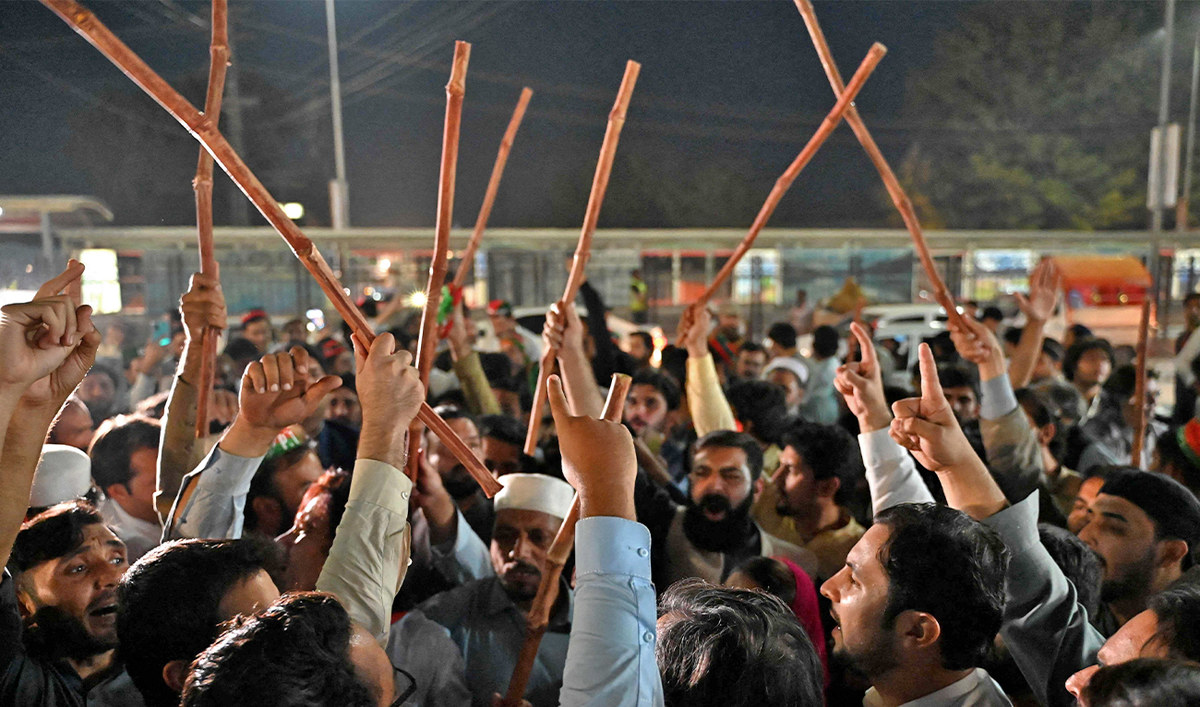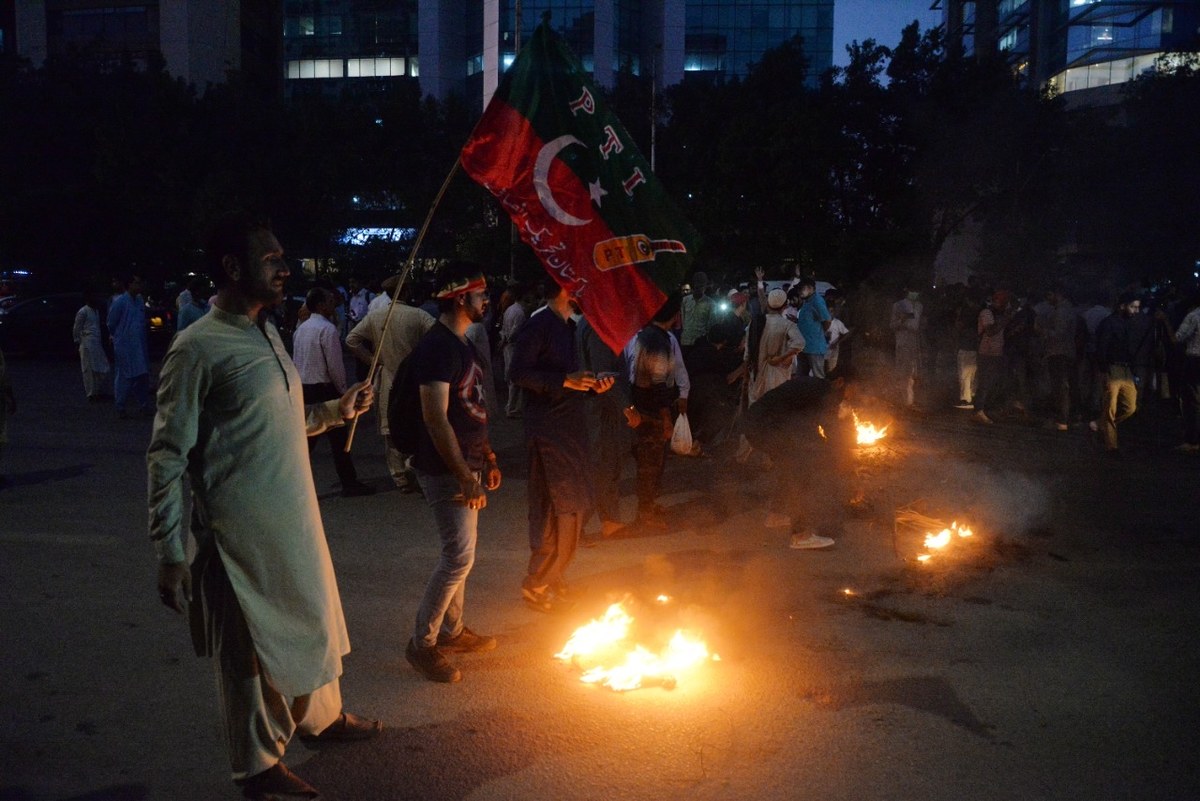ISLAMABAD: Former Pakistani Prime Minister Imran Khan’s party said on Thursday he had narrowly escaped a “well-planned assassination attempt” after the ex-premier was shot in the leg during a gun attack on his ‘long march’ convoy, unleashing protests around the country.
The attack took place as Khan was leading a march to the capital in a bid to pressure the government to announce early elections. The movement began from the city of Lahore last Friday and has made stops in different towns daily on the way to the capital, Islamabad, where the convoy had planned to reach by November 11. Khan’s followers were piled onto trucks and cars in the convoy but many were also marching alongside on foot.
Today, Thursday, the ex-PM’s caravan was meant to stop in Wazirabad city in Punjab’s Gujranwala district. Wazirabad is nearly 200 km (120 miles) from Islamabad.
According to a statement released by his Pakistan Tehreek-e-Insaf (PTI) party, Khan and his close aide Senator Faisal Javed were injured in firing by a shooter who was on the ground while the politicians were atop a container.
“It was a well planned assassination attempt on Imran Khan, the assassin planned to kill Imran khan and leadership of PTI,” Khan aide Chaudhry Fawad Hussain said, saying an automatic weapon was used. “No two opinions [about] that it was narrow escape.”
Dr. Faisal Sultan, who is heading the medical team treating Khan, told media outside the Shaukat Khanum Hospital that he was “stable.”
“Bullet shrapnels are in his leg,” the infectious disease specialist said in Lahore where Khan was moved, adding that one bone was chipped. “He has been taken to the operation theater.”
Sultan declined to comment further, saying more information would be shared after a detailed examination.
Photos and video footage shared by social media and TV channels showed Khan supporters taking to the streets in many cities of the country after the gun attack, including Islamabad, Lahore, Karachi and Peshawar.

Supporters of Pakistan's former prime minister Imran Khan, take part in a protest against the assassination attempt on Khan, in Peshawar on November 3, 2022. (AFP)
In Karachi, the financial hub of the country, PTI supporters blocked Shahrah-e-Faisal, a main thoroughfare running through the port city. Protests were reported in at least 24 locations in the city, creating severe traffic congestion.
Supporters also took to the streets in the cities of Lahore in Punjab province, Peshawar in Khyber Pakhtunkhwa and Gilgit city and the Khaplu Valley in the remote Gilgit-Baltistan region.
As questions arose nationwide about whether the protest movement would continue in light of the firing incident, Senator Faisal Javed said the march would go on.
“Imran Khan is safe,” he said in comments to the media outside a hospital, wearing a white shalwar kameez covered in blood, a bandage on his face. “Our [PTI’s] spirits are high and god willing this movement will not stop.”

Supporters of Pakistan's former prime minister Imran Khan, take part in a protest against the assassination attempt on Khan, in Karachi on November 3, 2022. (AN Photo)
In footage of the shooting shared on TV channels and social media, a man with a handgun was grabbed from behind by a Khan supporter at the gathering. He then tried to flee.
Later, TV channels showed footage of a man they said was a suspected shooter, who looked to be in his twenties or thirties. He said he wanted to kill Khan and had acted alone.
“He [Khan] was misleading the people, and I couldn’t bear it,” the suspect said in the video.
The information minister confirmed the footage was recorded by police.
No one has yet been charged with the attack.

Supporters of Pakistan's former prime minister Imran Khan, take part in a protest against the assassination attempt on Khan, in Karachi on November 3, 2022. (AN Photo)
“BLEEDING EXCESSIVELY”
Close Khan aide and former governor Imran Ismail told Geo News Khan had been shot three times in his left leg. He paid tribute to his leader’s bravery, saying that during the chaos that followed the shooting, the PTI leader tried to calm down his supporters and told them “not to panic.”
He said Khan was “bleeding excessively” and a bandage was tied to the former prime minister’s leg before he was moved to a Lahore hospital.
Senator Javed, Ismail said, was shot in the face and hand.
TV footage showed Khan, a bandage on his leg, being piled into a bulletproof car, with media reporting that he was being rushed to the hospital. Additional footage showed a wincing Khan being carried by supporters out of the container.
In a Twitter post, PM Shehbaz Sharif condemned the firing “in the strongest words” and prayed for Khan’s recovery. He also directed interior minister Rana Sanaullah and the police chief in Punjab to start a probe.
PTI leader and former human rights minister Shireen Mazari accused Sanaullah of threatening Khan, saying he should be arrested for attempted murder.
“The string pullers, the Establishment will also be held responsible by the nation for this murderous attack on Imran Khan,” she said on Twitter, referring to the powerful military.
Khan, once widely believed to have been supported by Pakistan’s powerful military establishment, is now considered to have fallen out with the army since his ouster through a parliamentary vote of no-confidence in April.
The former premier as well as members and supporters of his Pakistan Tehreek-e-Insaf (PTI) party have been criticizing the Pakistani military, which has ruled the South Asian country for almost half of its 75-year history, and the army chief, for not intervening to block his ouster, which he says was part of a United States-backed “foreign conspiracy.”
Washington, Khan’s political rivals who are now in power and the military deny the allegations.
In a statement released after the firing, the army’s media wing sent its “sincere prayers” to Khan for his “speedy recovery and wellbeing.”
Pakistan has a long history of political violence. Former Prime Minister Benazir Bhutto was assassinated in December 2007 in a gun and bomb attack after holding an election rally in the city of Rawalpindi, next to Islamabad.
Her father and former prime minister Zulfikar Ali Bhutto was hanged in the same city in 1979 after being deposed by a military coup.
Additional inputs by Saima Shabbir and Aamir Saeed in Islamabad, Naimat Khan and Zulfiqar Kunbhar in Karachi, Rehmat Mehsud in Peshawar, Nisar Ali in Khaplu Valley.
















